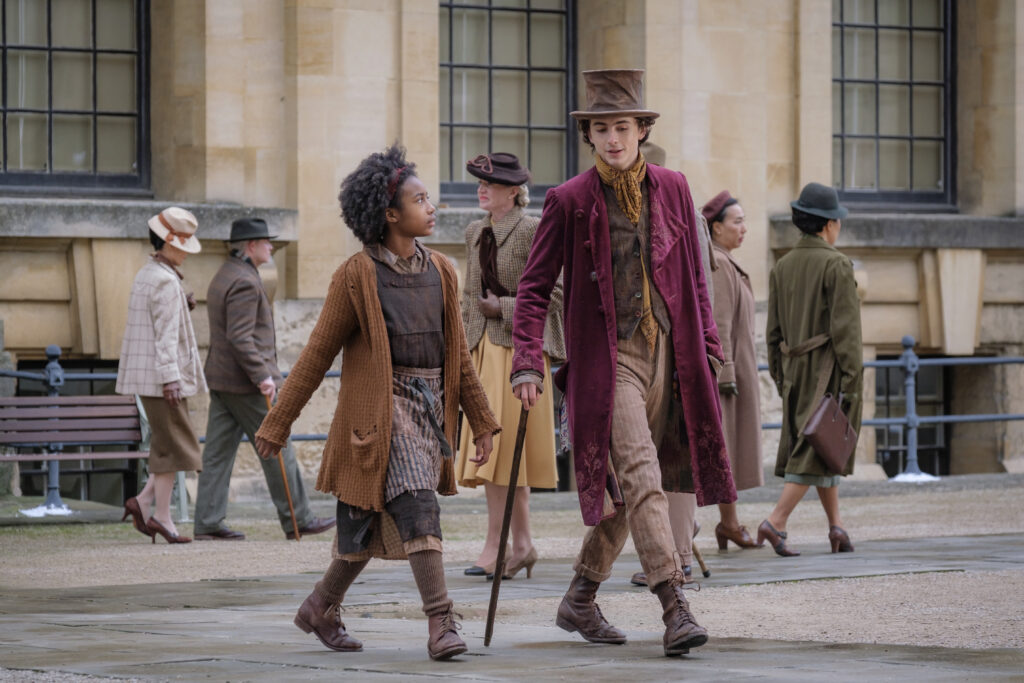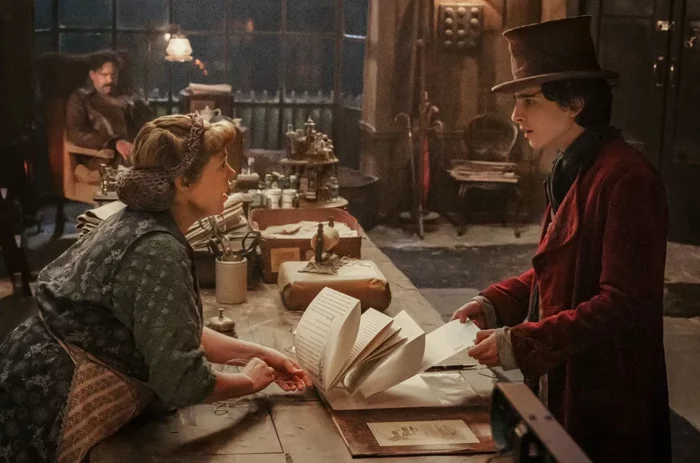In Paul King’s sunny, funny Wonka, Timothée Chalamet steps into the very big Roald Dahl-Gene Wilder shoes belonging to the world’s most famous chocolatier for a pleasing, throw-back musical of genuine sweetness. It turns out those shoes fit quite well, and far better than they did Johnny Depp in Tim Burton’s ill-conceived 2005 outing. King’s new picture refashions the character with an infectious kindness, jettisoning Wilder’s darkness and Depp’s eccentricity in favor of a youthful dreamer with a heart just as sugary as his confections.
Crafting an “origin” story featuring a young Willy Wonka (Chalamet) as a fledgling chocolate star on the rise, King, whose Paddington pictures were fun enough family fare, isn’t interested in the darker elements that informed 1971’s Willy Wonka and the Chocolate Factory, a classic of sorts and one piqued with bizarre, psychedelic trips, comically demented child comeuppance and a cynical, wild-card Wilder. Instead, King fashions his Wonka as a briskly celebratory holiday entertainment, one not without a few comically menacing touches but overall a firmly benign, escapist heart-tugger.

Picture opens with the now classic 1971 Willy Wonka number “Pure Imagination,” bound to evoke nostalgia for lovers of the original, and a number Chalamet well acquits; as a singer he doesn’t belt or push, instead using a pleasant tenor that might have been a tad more forceful but is nonetheless appealing in tone. His young Willy Wonka, who has “spent the past seven years traveling the world, perfecting my craft,” gets off the boat in 1930s London (a mixture of studio and real-life locations) with a chocolate recipe and a dream, quickly settling into a shady boarding house run by iron-fisted Mrs. Scrubbit, played by the always dependable Olivia Colman, who could deliver this caricature with her eyes closed (but boy, does she do it well), and her flamboyantly lovelorn sidekick Bleacher (Tom Davis).
Illiterate to the ever-scrolling fine print of the room rental contract, the trusting Wonka, an orphan whose deceased mother (a flashback fine Sally Hawkins) left him a single, unwrapped chocolate, unwavering belief in dreams and in “the kindness of strangers” (where have we heard that before?), quickly finds himself an indentured servant imprisoned in the house’s basement laundry, a fate which has befallen a collection of others former tenants who, while they may be facing a ruthless Dickensian fate are, in King’s hands, hopeless optimists.
Chief among them is an energetic scamp and household servant named Noodle (Calah Lane), an orphan herself whom Wonka takes a shine to, and the pair hatch a plan to launch his first chocolate emporium but not without some friction, namely a trio of comically nefarious, competitive London candymen, including the amusing Slugworth (a terrific Paterson Joseph) and a corrupt, candy loving police chief (Keegan-Michael Key) in cahoots with this “chocolate cartel.” Rowan Atkinson, whose mere appearance onscreen gets laughs, shows up as a befuddled priest contending with a secret sweet-tooth conspiracy and a runaway giraffe. And good sport Hugh Grant drops in as the original Oompa-Loompa, a chocolate thief with a clever past of his own which includes a longstanding Wonka grudge.

This is all undeniable fun, boasting fizzy production numbers, pretty good songs and a climax of contained, family-friendly danger in a buoyantly designed world of color and humor. As far as the songs are concerned, they are more charm than elaborate choreography or production numbers, and on that score they work their magic, particularly the jaunty ensemble number “A World of Your Own” upon the opening of Wonka’s chocolate shop, and the poignant ballad “For a Moment,” a lovely duet between Wonka and Noodle featuring nice harmonies and a transporting aerial respite from the grimness of the orphans’ predicament.
Chalamet is the golden ticket here, delivering an open-hearted turn that gives the picture its considerable spirit. The star, whose career high performance remains his Oscar-nominated turn in 2017’s Call Me by Your Name, is a distinctly contemporary performer even in period pieces, sometimes delivering powerfully (Bones and All) while at other times feeling adrift (Dune). Here he finds just the right, light touch; there isn’t a moment where he fails to be endearing. While it may be sacrilege to suggest such, for this viewer his performance is both more identifiable and engaging than prototype Wilder, whose much beloved 1971 incarnation has always struck me as a tad too cynical, tonally confusing and, well, schizophrenic. Wilder amorists will undoubtedly disagree with that assessment, but Wonka’s sincere Chalamet strikes an undeniably winning chord.
3 stars



